
Happy Tails | Bruce
Every single animal that comes through our shelter has a story. Some are complex, many are sad, but all of them get better the minute they arrive at the Virginia Beach SPCA. Bruce was surrendered to the VBSPCA by his previous owner in October 2021. With his sweet personality and long locks, it didn’t take long for him to get his second chance with a woman named Melissa, her husband, and their three resident cats. We recently caught up with Melissa to get an update on Bruce.
When did you adopt Bruce?
November 9, 2021.
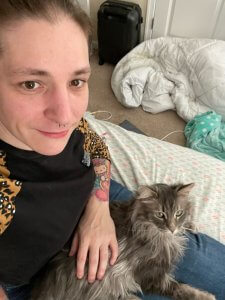 How did you find Bruce?
How did you find Bruce?
My husband and I went to the SPCA to look around, and Bruce caught my attention right away. He was rubbing against the cage and just didn’t want me to leave. We looked around a little more but I kept going back to him. He was so sweet and friendly, and so fluffy!
How is Bruce doing in the home?
He’s adapted really well. He was shy around the other cats for a while and didn’t like to venture around the house too much. But now he hangs out all over and loves being around his adopted siblings.
What sort of activities do you and Bruce do together?
Bruce is a very chill and relaxed cat. He doesn’t play very often with his people. But he LOVES attention. His favorite hobby is sitting on my lap, following me around the house, or joining me on zoom meetings – he’s definitely not camera shy.
Does Bruce have any funny quirks?
When Bruce wants attention and he feels he’s not getting what he wants, he will tap us on the face, or grab our face or arm in his paws to let you know he’s there and ready for pats. He also has the tiniest kitten meow but the loudest purrs.
How has Bruce enriched your lives so far?
He is one of the sweetest and friendliest cats I’ve ever been around. He helps me to relax by being so calm all the time. I love his warm cuddles. He’s very attached to me and I work from home, so I see him all the time.
Why do you think people should consider adopting a shelter pet?
All four of my current cats were shelter pets, and while I know everybody at the shelter does the best they can for animals, it’s no place for any animal to be long term. They deserve to be in a loving home with a family they can love back. Pets bring so much joy to our lives, and we should be bringing joy to their lives too.
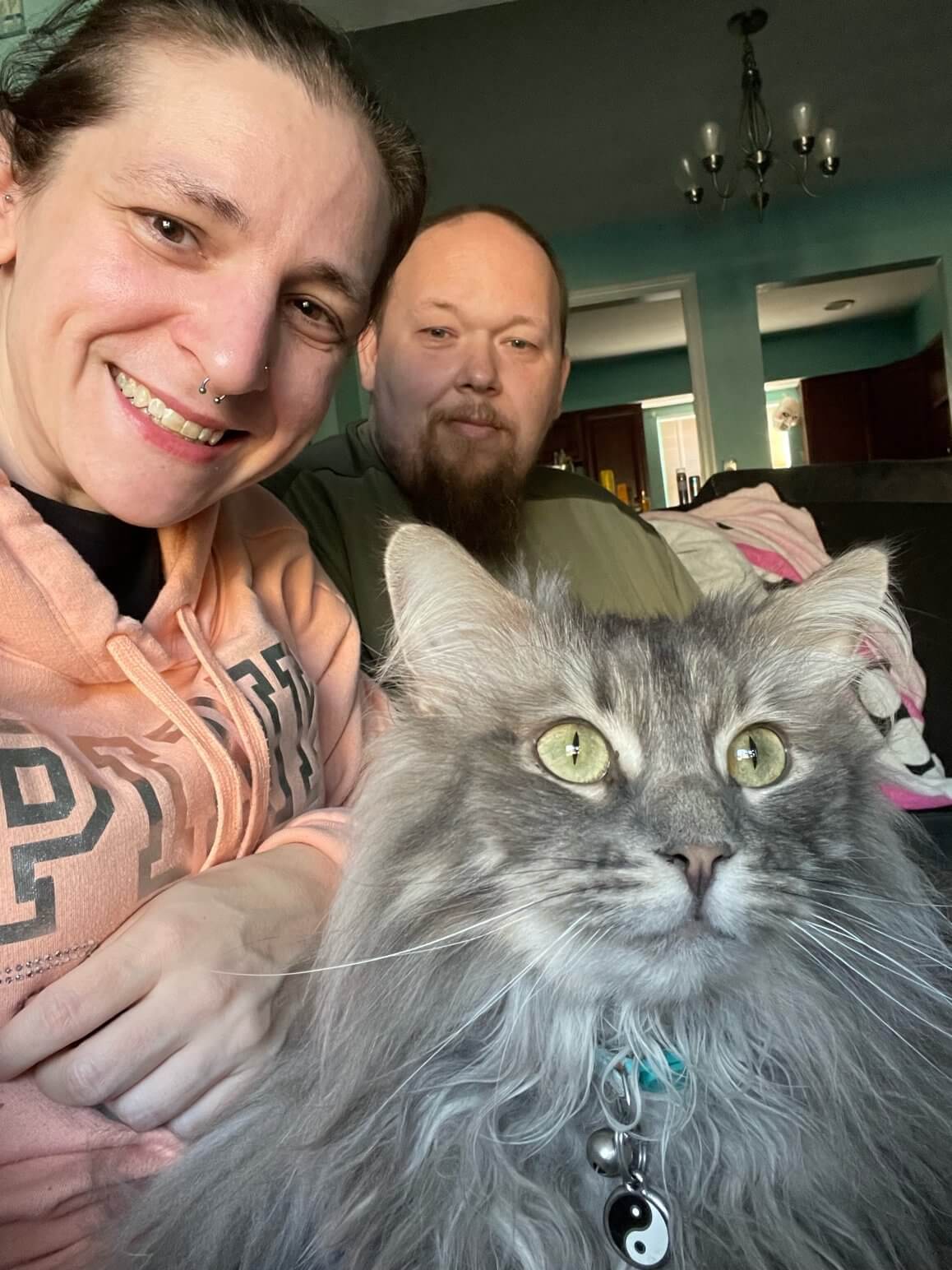

Happy Tails | Tater Tot
Every single animal that comes through our shelter has a story. Some are complex, many are sad, but all of them get better the minute they arrive at the Virginia Beach SPCA. In July 2021, Tater Tot was transferred to the VBSPCA in need of critical care. His right hind leg had been broken and never healed properly, and he was unable to put any weight on it. Tater Tot’s leg was amputated at the VBSPCA Clinic, and Tater Tot was able to recover from the surgery in a foster home. That’s where he ended up meeting the woman who would later adopt him: Amber. We recently caught up with Amber to learn more about Tater Tot’s adoption story and hear how he is doing now.
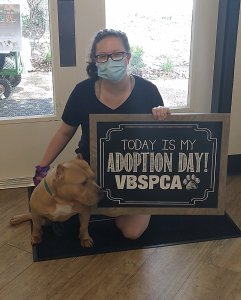 How did you find Tater Tot?
How did you find Tater Tot?
My stepmom, Alexis, was the volunteer to medically foster Tater Tot after his leg was amputated. I was in the process of moving back into the house and wasn’t aware she was about to be fostering a dog. As I was unpacking, she walked in with this block-headed, stubborn, drowsy, golden-eyed baby, and for me it was love at first sight. That evening I started asking her questions on what the process to adopt a dog was. It still took about 3 weeks for me to fully commit – I wanted to be sure I was in the right emotional/financial state to ensure Tater got what he really needed.
How is Tater Tot doing in the home?
Tater Tot is doing fantastic! He’s finally figured out how to get himself up on the couch, where he will stare out the window for hours, and he has a mountain of toys that he will cycle through each week.
What sort of activities do you and Tater Tot do together?
Tater Tot is always excited for his three daily walks, and when I come home we have a game of zoomies around the house. We also have a routine of going to get a puppuccino from Starbucks every weekend.
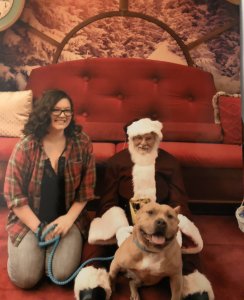 Does Tater Tot have any funny quirks?
Does Tater Tot have any funny quirks?
He’s adjusted so well without his back leg, but sometimes he will go to scratch his neck and his little nub just wiggles, so I always save the day and offer neck scratches. He’s recently figured out how to kick the dirt and grass behind him on a walk which he is very, very proud of.
One of his current favorite toys is a hard plastic egg that smells like cheese, which he will constantly grab and “bury” in the couch cushions or a fluffed up blanket and if you watch him, he will pout and move it somewhere else. He also has a game that I call corn cobbing, where we will both be relaxing and out of nowhere he grumbles and will proceed to nibble up and down my leg or arm as if he was eating corn on the cob.
How has Tater Tot enriched your life so far?
Tater has made my life so much more enjoyable. Who would have thought hearing a dog snore right next to your ear while he tries to steal your pillow would be as comforting as it is? I am always so happy to come home and see his tail just going a mile a minute while also trying to balance on his one back leg.
Why do you think people should consider adopting a pet with special needs?
People should adopt a dog with special needs because as much as you teach them new tricks or commands, they teach you how to work around their differences. Whenever I tell my coworkers about Tater Tot’s disability, they look at me so heartbroken and ask “are you going to get him wheels or something?” If only they knew how lively he is and how little his disability affects him!
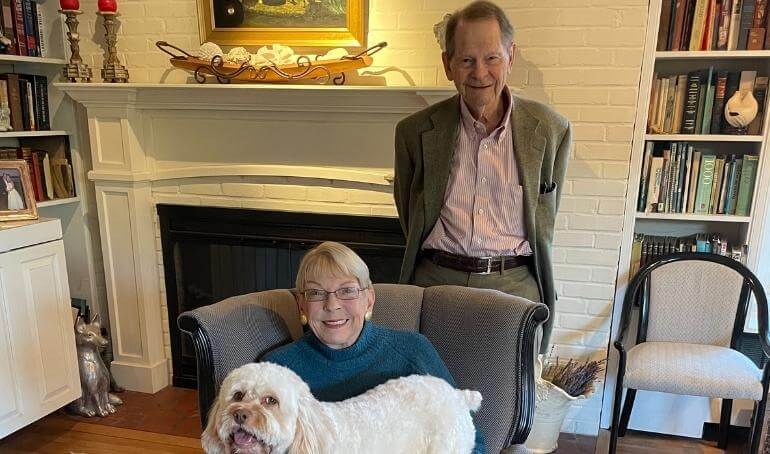
2022 VBSPCA Lifesaver Award Recipients: Jan & Morris Fine
For Jan and Morris Fine, a house isn’t a home without a pet or two. Animals have been a part of both of their lives since well before they were married in 1976. Currently Ginger, a four year old Cockapoo, serves as resident canine at their Virginia Beach home, but one look around will tell you that Ginger has not been the only beloved pet in their family. Portraits of all of their animal companions who have crossed the Rainbow Bridge over the years are lovingly displayed in their house.
“We’ve either had cats or dogs or both for as long as I can remember,” says Jan. “They have brought us great joy. They have made it an exciting adventure.”
It’s not enough for the Fines to provide a good life to countless pets: they’ve dedicated their time and talents to helping the homeless animals of the Virginia Beach SPCA for nearly two decades. Their ongoing commitment to the mission of the VBSPCA is being recognized with the 2022 Lifesaver Award, which will be presented to Jan and Morris at our Wags & Whiskers Gala on Saturday, April 2, 2022. However, the Fines are very humble about their contributions being acknowledged.
“We’re not real sure why,” laughs Jan. “It’s a wonderful organization. We have been very, very lucky to be able to do the things we’ve done. We’re so glad that the VBSPCA is there to take care of all of our little critters.”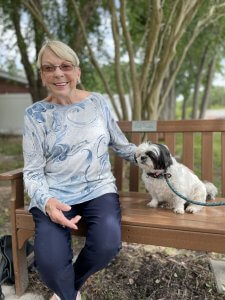 Jan first got involved with the VBSPCA when Mary Reid Barrow approached her about serving alongside her on the Board of Directors. It didn’t take much convincing – she said yes right away. The VBSPCA is one of several nonprofit organizations where Jan has volunteered in addition to her long career history that includes secretarial work, proofreading, owning a store, and being a mother of three. While Jan devoted more than 15 years of service as a VBSPCA board member, she ended up bringing Morris along for the ride.
Jan first got involved with the VBSPCA when Mary Reid Barrow approached her about serving alongside her on the Board of Directors. It didn’t take much convincing – she said yes right away. The VBSPCA is one of several nonprofit organizations where Jan has volunteered in addition to her long career history that includes secretarial work, proofreading, owning a store, and being a mother of three. While Jan devoted more than 15 years of service as a VBSPCA board member, she ended up bringing Morris along for the ride.
“I kept offering his services,” Jan chuckles. “He’s been a big help.”
That’s no understatement. One of Morris’ largest contributions involved a sizable bequest from a local veterinarian who passed away. As a lawyer who has been practicing law for 66 years, Morris took on what he describes as “a monstrous crusade” due to an issue involving the donor’s intent for that portion of his estate. Morris donated his time and spent years representing our organization. “It was an interesting case,” says Morris. “It took some muscling and going to court many, many times.” His perseverance paid off: the money was eventually awarded to the VBSPCA.
In addition to the work they’ve already done for the VBSPCA, the Fines will also leave a legacy of their own. “We set up a fund at the Hampton Roads Foundation,” explains Morris. “It provides an annual amount of money to the operations of the VBSPCA. That will be there after I am gone and possibly even after my wife, who is much younger than I am. And prettier, too!”
When asked about all of their involvement and contributions over the years, it’s hard for the Fines to pinpoint a memorable moment. But their fondest recollections, not surprisingly, are connected to the animals that have been brought into their lives through our shelter. There’s the time they wanted to adopt a small dog from the VBSPCA shelter, only to come home with Scooby, a German Shepherd/Rottweiler/Labrador Retriever mix. Or the three cats that their oldest son, Rob, adopted from the VBSPCA.
“All these animals that were part of our family… all of our children and all of the people in our family are animal people,” says Morris.
“We’ve loved some [animals] more than others,” jokes Jan. “Our daughter Beth has puppies who, so far, have messed up at least two couches, and a chair, and a rug… but they’re still allowed back!”
Something tells us that an animal would never be turned away from the Fine household.
“Putting the right animal with the right family in a happy forever home is very special.” – Jan Fine
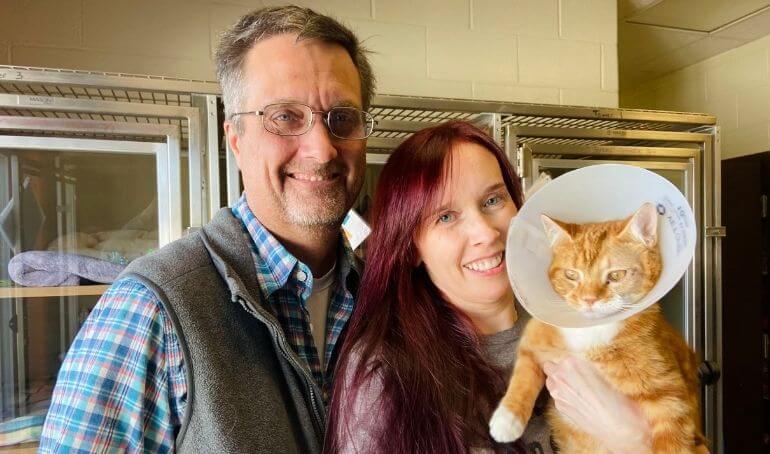
2022 VBSPCA Compassion Award Recipients: Tonya & Rob Deveau
There are animal people, and then there are Tonya and Rob Deveau. When asked what role animals play in her life, Tonya is quick to explain, “the biggest role! Animals are the whole reason I started my business.”
The Deveaus are the family behind My Vegan Sweet Tooth, the all-vegan Virginia Beach bakery they opened in 2010. You’ll find their mission plainly stated on their website: to help animals while providing delicious vegan treats. All tips from customers go directly to five local animal charities including the Virginia Beach SPCA. Their continued generosity is being honored with the 2022 Compassion Award, which will be presented to Tonya and Rob at our Wags and Whiskers Gala on Saturday, April 2, 2022.
Being named the recipients of the Compassion Award came as a shock to Tonya. “I’m just trying to help the helpless any way I can,” she explains. “I can’t stand to think there are animals who need help and go without.”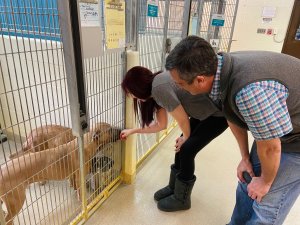 In addition to their financial contributions, Tonya and Rob’s support of the VBSPCA spans more than two decades. Tonya began volunteering 23 years ago, donating her time to perform a variety of tasks including wildlife transport and cleaning the cat cabins at a local PetSmart that houses adoptable VBSPCA felines. As a couple, Tonya and Rob have fostered countless kittens for the VBSPCA. They’ve adopted plenty of our felines as well, including the six cats they currently have at home.
In addition to their financial contributions, Tonya and Rob’s support of the VBSPCA spans more than two decades. Tonya began volunteering 23 years ago, donating her time to perform a variety of tasks including wildlife transport and cleaning the cat cabins at a local PetSmart that houses adoptable VBSPCA felines. As a couple, Tonya and Rob have fostered countless kittens for the VBSPCA. They’ve adopted plenty of our felines as well, including the six cats they currently have at home.
“Tonya has always had a heart for animals, and it just kind of grows on you,” says Rob. “To see her care for cats and bring them into the house… it’s kind of rewarding.”
The financial donations the Deveaus make to our shelter are directed to provide veterinary care for animals that have more extensive medical needs. By covering those costs, the animals have a better chance at finding a home: the animals get the care they so desperately need without adding large costs to their adoption fees.
Their philanthropy model – to divert all tips to local animal charities – inspires a sense of compassion in our community, a core component of the VBSPCA mission. It’s not only the customers who act compassionately by giving, but the employees of My Vegan Sweet Tooth as well. “When I hire them, they know they’re not getting tips,” says Tonya. “They’re there for the right reasons.”
The Deveaus have passed their compassion for animals to their two children as well. “I have a lot of great memories [at the VBSPCA], but I think my proudest was when my daughter became old enough to volunteer and was at the shelter for several years,” says Tonya. As for Rob’s fondest memories, he has enjoyed the many foster kittens they have welcomed over the years. “It’s been fun,” he says. “It really warms your heart to help those little things that need a home.”
“Animals give so much unconditional love. They make me incredibly happy, and helping them in any way I can is really rewarding.” – Tonya Deveau

Running with Your Dog | Keep Exercise Safe and Fun
Dogs can make great running buddies, and there are several benefits to logging your miles together. It’s a great way to bond with your canine companion, and they will enjoy getting some exercise outside. Running can also ward off obesity and heart disease in your pet as well as help boost their confidence, which is vital to their mental health. But before you grab your pup’s leash and head out the door, you should think through the health and safety issues that could arise.
It is important to note that not every dog is a suitable running buddy. In fact, running can be dangerous for some breeds. This is especially true for brachycephalic breeds, or flat-faced breeds, such as Pugs, Boxers, Shih-Tzus, and Bulldogs. Their short snouts can cause breathing difficulties and make them more likely to overheat. No matter the breed, your pet’s individual health should be considered before you start running together, so it is best to talk with your veterinarian.
Start Slow
When it comes to mileage, start slow. Just like humans, dogs need to gradually work up to running longer distances. You can begin by introducing short intervals of running during your usual walks. It is also a good idea to train your pet to run on one side of you. That will prevent them from darting back and forth, which could trip you up and cause injury to one or both of you.
Consider the Conditions
Humans have running shoes and clothing to keep them comfortable in a variety of conditions, but dogs do not. Running in heat could not only cause your pet to overheat, but they could burn their paws on hot pavement or sand. Additionally, long distances on hard surfaces could be tough on their paws no matter the weather.
Get the Right Gear
Make sure you have an appropriate harness and leash for your pup. Using a harness instead of a collar will prevent your pet’s neck from being yanked if they get excited and try to run ahead. While you can use a regular leash while running, there are also short leashes that connect to a belt that you wear.
Put Your Pup First
While your fitness goals are important, you must always put your pup first if you are running together. If your dog needs to stop to rest or is unable to keep up with you either in distance or pace, do not force them to keep going. You can always run a short distance with your dog, then drop them off at your house before finishing your scheduled miles for the day. It is also important to make sure they are hydrated, especially in the summer months.
Running with your dog is a great way to further build your connection, but not every pup winds up being a great running buddy. It is important to remember that all pets need exercise, so be sure to find the appropriate activity level for your dog so that they are happy and healthy.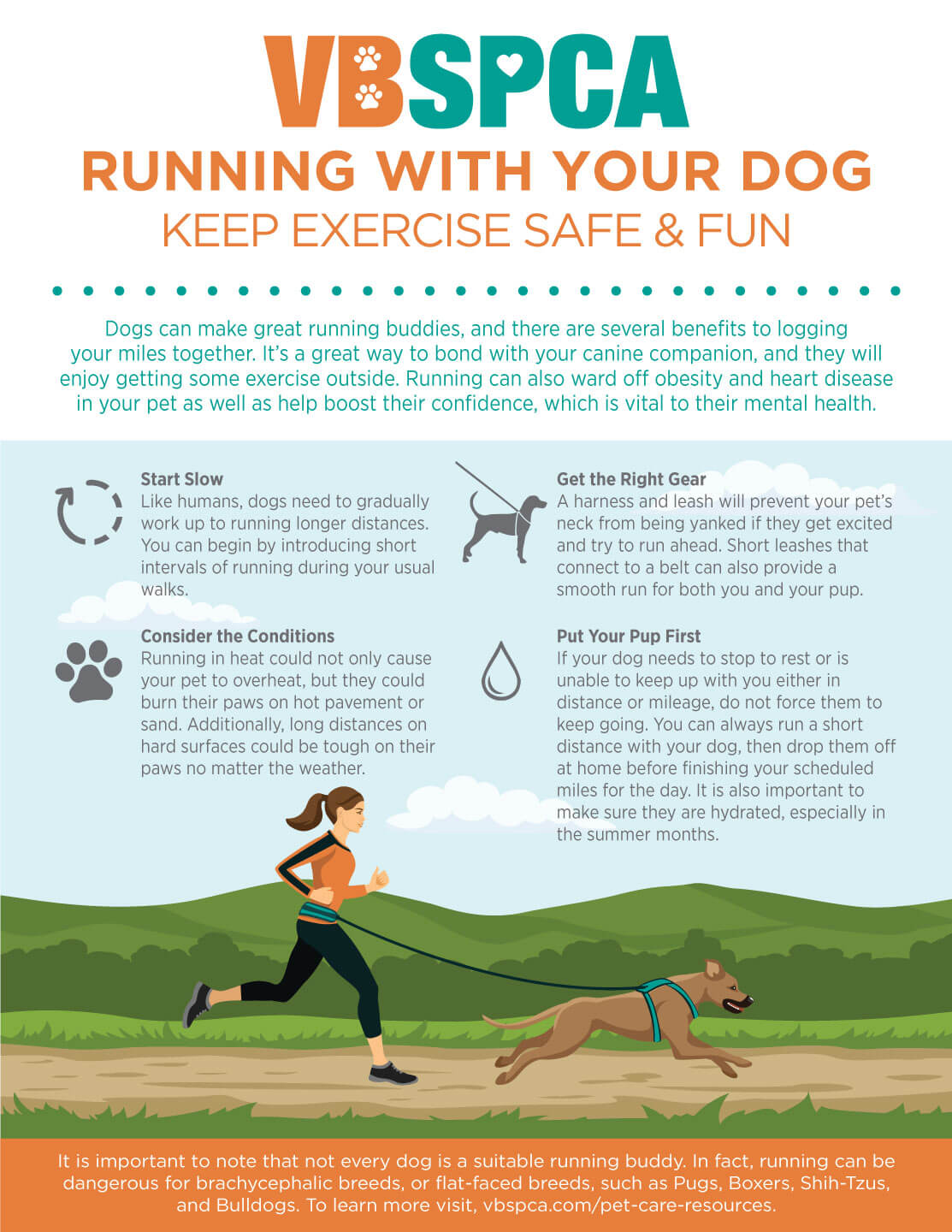

Spaying and Neutering | Health and Community Benefits
Every year, millions of unwanted animals show up in animal shelters across the United States. According to the ASPCA, approximately 6.3 million animals end up in shelters each year, many of them the result of unplanned litters. Spaying and neutering your pets is critical to combatting this problem, but these common surgical procedures also benefit your furry friend as well!
Let’s start with the basics: spaying is the removal of the ovaries and uterus of a female dog or cat while neutering is the removal of testicles from males. Both surgeries are extremely safe and more cost effective than caring for an unexpected litter of puppies or kittens. In fact, the Virginia Beach SPCA offers low-cost spay and neuter services in our effort to reduce the number of unwanted pets in our community who would likely end up in shelters like ours. Additionally, all of our canines and felines are altered before they are adopted.
Many people don’t realize just how important spaying and neutering really is, but the numbers don’t lie. According to PETA:
- 1 female cat and her offspring can produce 370,000 kittens in just 7 years
- 1 female dog and her offspring can produce 67,000 puppies in just 6 years
That’s hundreds of thousands of animals who could end up as strays or turn up in shelters!
While spaying or neutering your pet helps the community by preventing the births of unwanted animals, it also provides some benefits to you and your pet.
Health Benefits
Females: Spaying prevents uterine infections and breast cancer, which is fatal in about 50% of dogs and 90% of cats. Spaying offers the best protection from these issues when completed before a female’s first heat.
Males: Neutering prevents testicular cancer and some prostate problems.
Other Benefits
Females: Spayed females will not go into heat. While female cats do not typically bleed while in heat, female dogs do. However, felines in heat tend to yowl and urinate more frequently, sometimes outside of their litter boxes.
Males: Neutered males are much less likely to run away from home. Because of changes in their hormone levels, they aren’t motivated to run off in search of a mate. Neutering has also been shown to reduce behavioral issues like territorial marking and aggression.
With your help, we can reduce the number of unwanted animals in our community and beyond. For information on the Virginia Beach SPCA’s low-cost spay and neuter services, click here.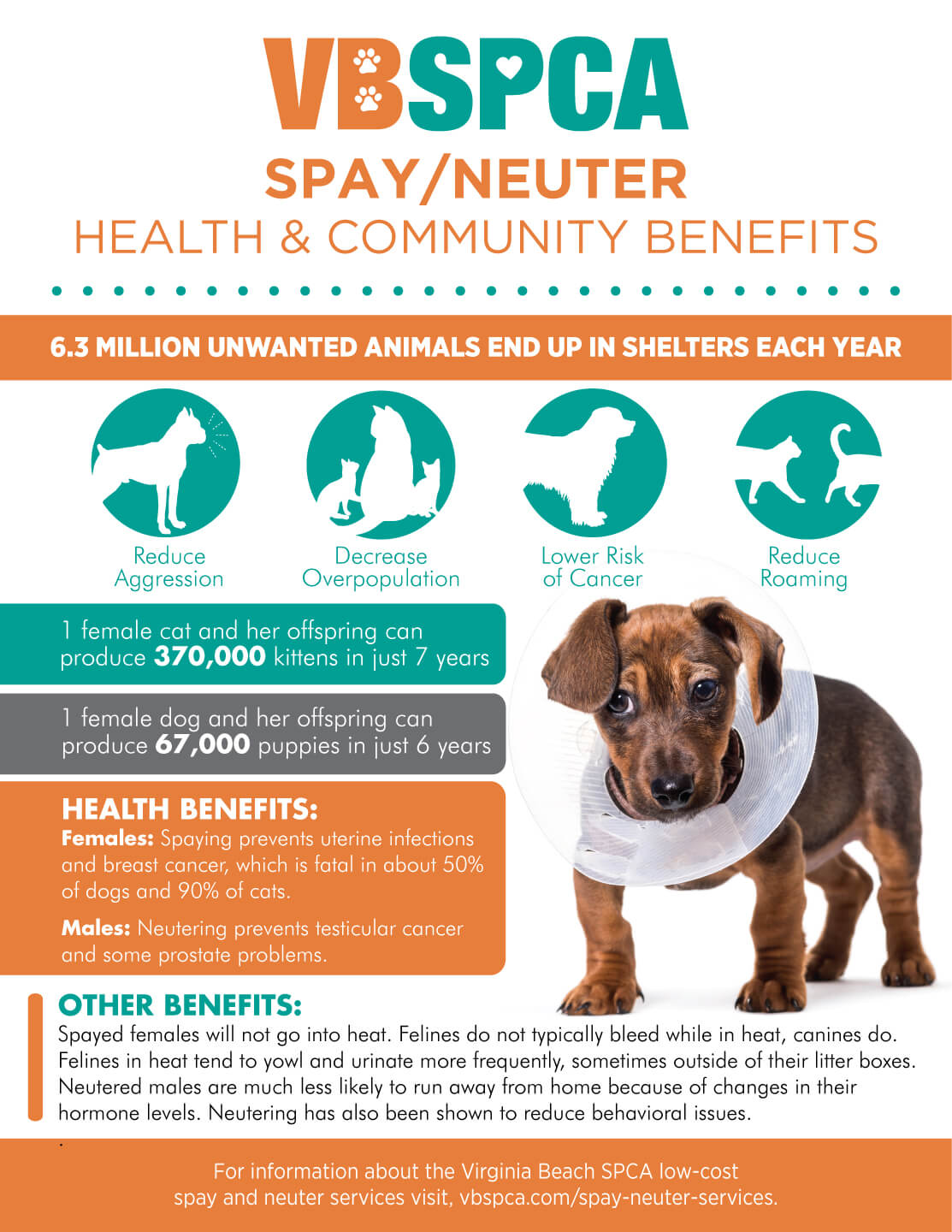
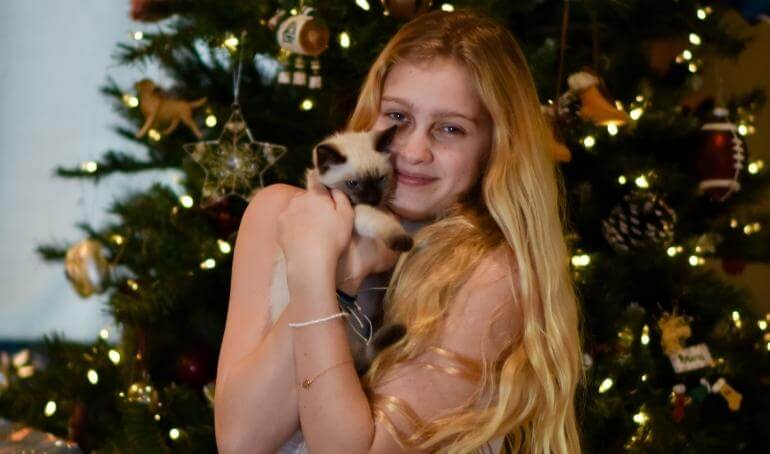
Happy Tails | Emmie
Every single animal that comes through our shelter has a story. Some are complex, many are sad, but all of them get better the minute they arrive at the Virginia Beach SPCA. Emmie and her two sisters were found abandoned as young kittens in November 2021. The trio was placed into a VBSPCA foster home until they were strong enough for the adoption process. Once Emmie was back at the shelter, it didn’t take long for her to catch the eye of Sharalee and her family. We recently caught up with Sharalee to get an update on Emmie.
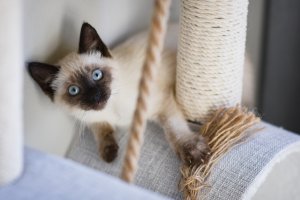 When did you adopt Emmie?
When did you adopt Emmie?
We adopted Emmie on Saturday, December 4th, 2021. Our daughter Lily, 13, had been asking for a kitten for years. We waited until we knew she would be able to care for her in the way a cat needed. The tears in our daughter’s eyes when we pulled into the VBSPCA Shelter’s parking lot is a moment we will always remember.
How did you know Emmie was the one for you?
We knew right away we wanted to meet Emmie. Her Siamese coloring was just too beautiful to ignore. There was another couple in the room with her, and we had no way of knowing if they would select her. We played with several other kittens and fell in love with all of them. However, once we started playing with Emmie and my daughter held her, we knew she was the one.
How is Emmie doing in the home?
Emmie is doing wonderfully. She is snuggly and talkative, meowing the second she sees someone. She stretches out her paws from her cat tree and begs to be picked up. She always wants a snuggle.
What sort of activities do you and Emmie do together?
We play with her with toys or on her cat tree. She likes looking in mirrors. We also got her a harness to take her on walks, though she’s not quite used to that yet. The first couple of times we put on the harness, she just flopped right over. We are taking it slowly introducing her outside. She is excited to see everything but gets overwhelmed.
Does Emmie have any funny quirks?
Emmie does this little trilling noise when she runs and plays. It’s not a purr or meow. It’s like a rolling squeak. She will hide under the bed and then leap at your arm and roll over onto her back clutching your arm before she darts off again to prowl after her next victim.
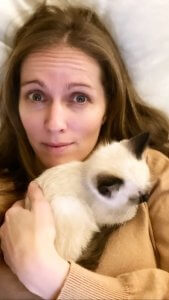 How has Emmie enriched your lives so far?
How has Emmie enriched your lives so far?
I’ll be honest and say that we weren’t expecting the whole family to fall in love with Emmie. She was my daughter’s and still primarily stays with her. However, it has brought our family together as we fight over who gets to play with her or snuggle with her next. She is certainly loved!
Why do you think people should consider adopting a shelter pet?
There are so many animals that need love and a home. We never considered a breeder. My husband and I visited the shelter prior to bringing our daughter in and there were so many precious animal babies needing homes. We knew immediately that our daughter would have no problem finding her forever little best friend.
I am so grateful for the VBSPCA caring for not just our sweet Emmie before we welcomed her home, but all the animals that have entered their doors, whether they had a short or long stay.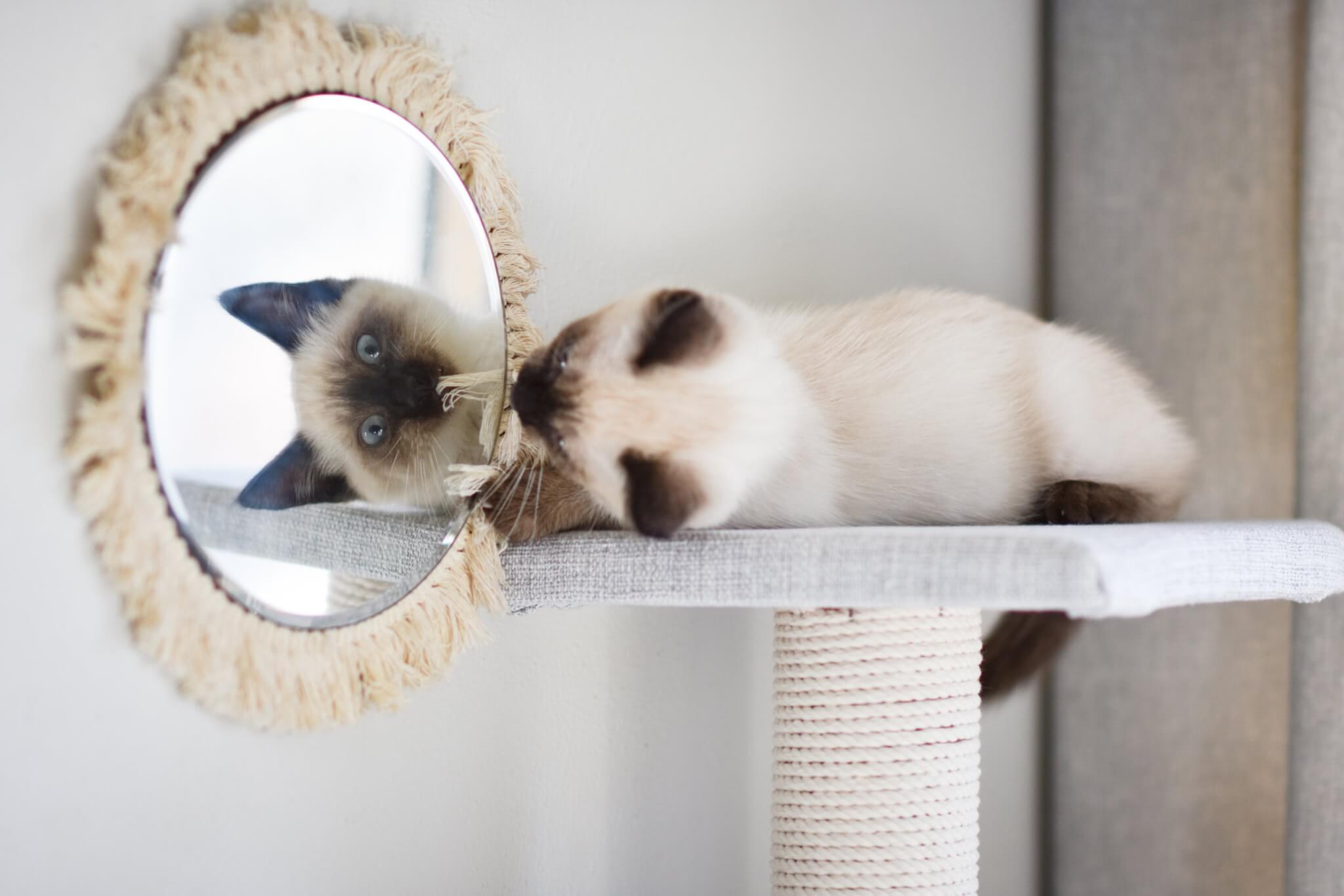

Dr. Towana Hunter, Ed.D | In Service to the VBSPCA for 9 Months
It was 15 years ago that Dr. Towana Hunter first got involved with the Virginia Beach SPCA. While working with Southeastern Cooperative Educational Programs, she brought students to volunteer at our shelter once a week. “It was such a great opportunity for them,” says Dr. Hunter. “I love what the program has grown into.” Fast forward to now, as Dr. Hunter is finishing her first year of service as a member of the VBSPCA Board of Directors. She began her career as a mental health technician before taking a role as a school counselor and department chair for the Virginia Beach City Public Schools. In 2020, she earned her doctorate in educational leadership and is transitioning into an instructional specialist this month.
Fast forward to now, as Dr. Hunter is finishing her first year of service as a member of the VBSPCA Board of Directors. She began her career as a mental health technician before taking a role as a school counselor and department chair for the Virginia Beach City Public Schools. In 2020, she earned her doctorate in educational leadership and is transitioning into an instructional specialist this month.
Dr. Hunter lends her education expertise to influence the VBSPCA’s humane education program, which instills values of kindness and respect in children. “I’m most passionate about creating responsible humans,” says Dr. Hunter. “As a community, we depend on each other to do what is right when it comes to pets and animals. That includes vaccines, spay/neuter services, and overall commitment to providing the best care for your pet.”
Much like her initial involvement with the VBSPCA, Dr. Hunter encourages others to volunteer. “Another way to get involved would be fostering an animal, or sponsoring a fundraiser.” she adds.
Board members like Dr. Hunter are crucial to furthering the VBSPCA mission of eliminating animal suffering. We are thankful for everything she does to help our animals!
If you are interested in serving on the Virginia Beach SPCA Board of Directors, please email derby.brackett@vbspca.com for more information.
VBSPCA Pups to Play in Puppy Bowl
Two Virginia Beach SPCA pups will be playing in this year’s Puppy Bowl! Heidi and Sammie were both selected for Team Fluff, who will take on Team Ruff in the cutest matchup you’ll ever see.
While the big game is a few weeks away, it’s never too early to start planning for such an adorable event. Here’s how you can watch the Puppy Bowl and cheer on Heidi and Sammie:
At the Smartmouth Pilot House
Our friends at Smartmouth Brewing will be showing the Puppy Bowl at the Smartmouth Pilot House and have even created a special beer for the occasion! It takes place at 2pm on Sunday, February 13, 2022. While you’re enjoying the big game, be sure to try a VBSPCA Second Chance Sour Ale, a limited small batch production of Zoinks by Smartmouth Brewing Company. A portion of beer sales will be donated to the VBSPCA.
Watch at Home
This year’s Puppy Bowl will be shown on February 13th at 2pm on Animal Planet and can be streamed on Discovery+. Even if you decide to watch at home, you can still make a toast to Sammie and Heidi with our special edition beer! Stop by Smartmouth Brewing to pick up a four-pack of VBSPCA Second Chance Sour Ale beginning Friday, February 11th.
This year marks the fifth time that VBSPCA animals have made appearances in the Puppy Bowl. Jill, a kitten, was featured in the 2021 event. Now it’s Sammie and Heidi’s moment to shine! We’re so proud of our VBSPCA pups. Go Team Fluff!
Click here to learn more about this year’s Puppy Bowl.

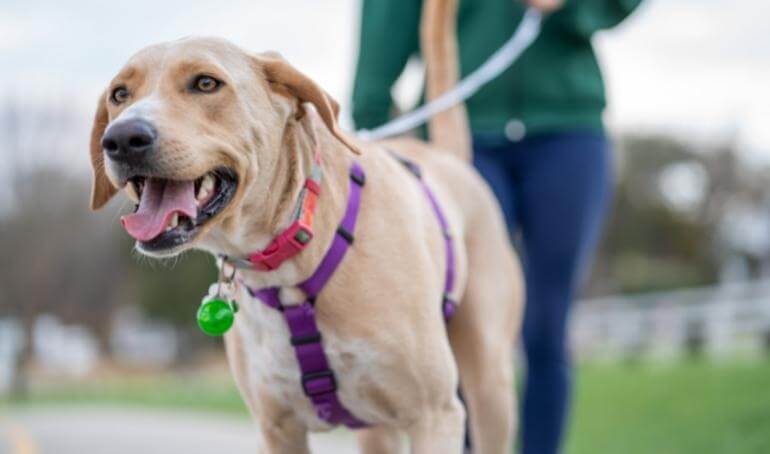



















Last Updated: June 8, 2022 by vbspcaadmin
The Inside Scoop | Why Pet Cleanup Matters
While there are many pleasant parts of being a pet parent, cleaning up after them isn’t exactly one of them. However, picking up after your dog is extremely important! It doesn’t matter if your pup relieves themself in your backyard or while on a walk: you should always pick up the poop.
It’s a Pollutant
The Environment Protection Agency classifies dog waste as a pollutant. When pet waste gets into our waterways, it breaks down and causes excessive algae and weed growth. That can make waterways unsuitable for swimming, fishing, and other recreational uses.
Because pet waste can be so damaging to the environment, it is important never to let your pet go to the bathroom in or close to a waterway.
It’s Neighborly
A common grievance on community apps is that people are not picking up after their pets. This un-neighborly behavior is disrespectful to the community and to the environment, so please be mindful of the shared spaces and leave them how you found them… absent of your pup’s poop.
It’s the Law
If those other reasons weren’t enough, leaving dog waste on the ground is illegal. You are required by law to pick up after your pet in public places in Virginia (as well as many other states and localities).
It Transmits Disease
Dog excrement can transmit disease to both humans and other animals. Parasites, bacteria, and viruses can all be transmitted from dog waste to the soil, which can then be passed on to people and other pets. This is especially troublesome for children playing outside or adults who like to garden. Common issues include:
Problematic Parasites:
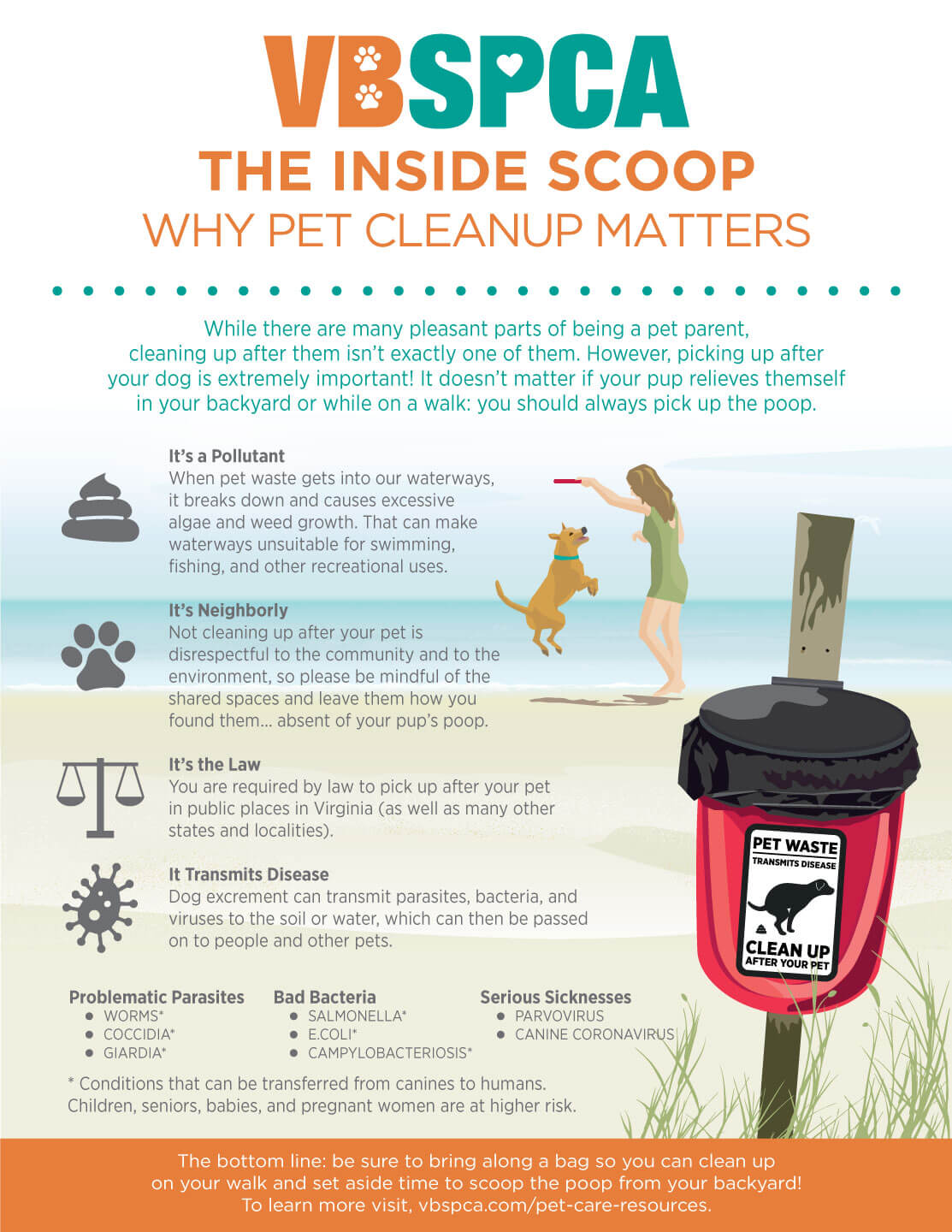
WORMS*
COCCIDIA*
GIARDIA*
Bad Bacteria:
SALMONELLA*
E.COLI*
CAMPYLOBACTERIOSIS*
Serious Sicknesses:
PARVOVIRUS
CANINE CORONAVIRUS
* Conditions that can be transferred from canines to humans. Children, seniors, babies, and pregnant women are at higher risk.
Additionally, dog waste is not a fertilizer as some might think. The high nitrogen levels found in your pet’s poop are actually toxic for your lawn.
The bottom line: be sure to bring along a bag so you can clean up on your walk and set aside time to scoop the poop from your backyard!